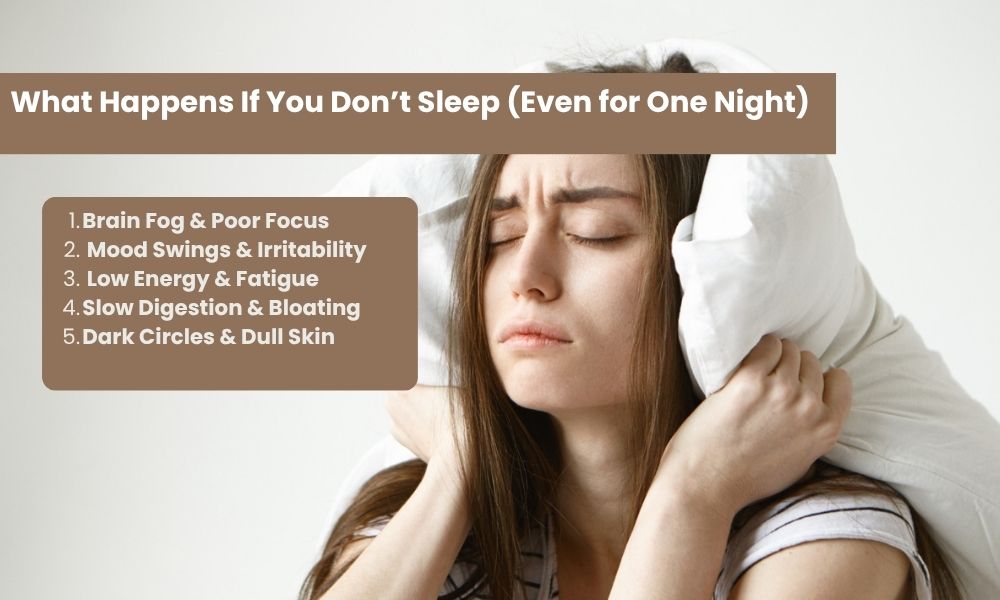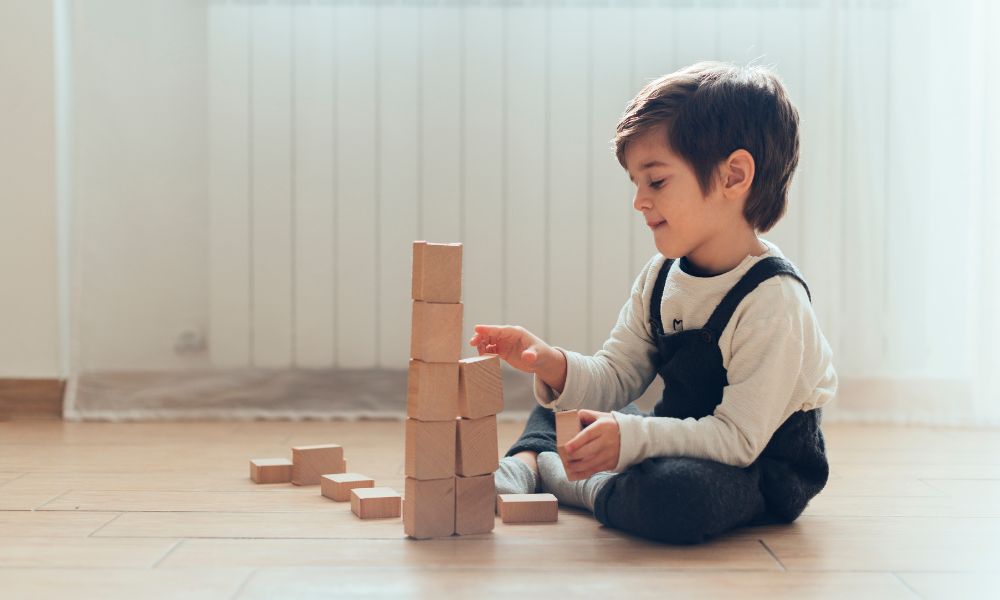What Happens If We Don’t Sleep? Ayurvedic Insights on Sleepless Nights

Sleep is one of the most vital pillars of life — as essential as food and air. In Ayurveda, Nidra (sleep) is one of the Trayoupstambha — the three main supports of life, along with Aahar (diet) and Brahmacharya (balanced living).
But in today’s fast-paced world, sleeplessness has become common. In India, around 25–30% of adults suffer from poor sleep quality or insomnia. Studies show that many working professionals and students stay awake past midnight, using screens or battling stress — not realizing how much harm even one sleepless night can cause.
So, what happens if we don’t sleep properly or skip sleep at night? Ayurveda gives us both answers — and solutions.
What Happens If We Don’t Sleep — Short-Term Effects
Skipping a night’s sleep may seem harmless, but even one restless night can disturb your body’s natural rhythm. Let’s understand what happens if we don’t sleep for a night:
-
Brain Fatigue and Poor Focus
Sleep helps the brain process information. Without rest, memory, focus, and concentration drop sharply. You may feel confused, forgetful, or mentally foggy the next day. -
Mood Swings and Irritability
Lack of sleep increases Vata imbalance — leading to anxiety, irritability, and mood changes. This is why even one sleepless night can make you feel emotionally unstable. -
Low Energy and Fatigue
When we skip sleep, our energy reserves drop. The body doesn’t get enough time to repair tissues or restore energy. You feel dull and heavy throughout the day. -
Disturbed Digestion
According to Ayurveda, sleep supports Agni (digestive fire). When you don’t sleep properly, digestion slows down, causing acidity, bloating, and loss of appetite. -
Puffy Eyes and Dull Skin
Lack of sleep reduces blood flow to the skin and increases cortisol (stress hormone). This results in dark circles, dullness, and early signs of ageing.
What Happens If We Don’t Sleep Regularly — Long-Term Impact
When sleeplessness becomes a routine, the effects grow deeper and more harmful. Here’s what happens if we don’t get enough sleep every night:
-
Heart and Blood Pressure Problems
Chronic sleeplessness raises blood pressure and heart rate. Ayurveda relates this to Pitta aggravation, leading to stress and inflammation. -
Hormonal Imbalance and Weight Gain
Sleep controls hormones like insulin and leptin. Poor sleep causes cravings, overeating, and weight gain — increasing risk of diabetes and obesity. -
Mental Health Disorders
Long-term sleep deprivation increases anxiety, depression, and restlessness. The manas dosha (mental energy) gets disturbed, making the mind overactive and irritable. -
Weakened Immunity
Sleep strengthens ojas — the body’s vital essence that supports immunity. Without rest, the immune system weakens, making you prone to infections and fatigue. -
Reduced Productivity and Focus
Lack of proper sleep affects performance, decision-making, and creativity. Even simple tasks feel difficult because the brain is not recharged.
Ayurvedic View: Why Sleep (Nidra) Is So Important
Ayurveda teaches that “Happiness, sorrow, strength, weakness, knowledge, and ignorance all depend on sleep.”
Nidra restores balance in all three doshas — Vata, Pitta, and Kapha.
When sleep is disturbed:
- Vata increases → anxiety, dry skin, restlessness
- Pitta increases → anger, irritability, heartburn
- Kapha decreases → fatigue, heaviness, dullness
Proper sleep balances these energies, rejuvenates tissues, and refreshes both body and mind.
Ayurvedic Tips for Better Sleep
If you are wondering what will happen if we don’t sleep and want to fix it naturally — Ayurveda offers gentle, safe solutions.
-
Follow a Fixed Sleep Schedule
Go to bed before 10 p.m. and wake up early. This aligns your body clock with nature’s rhythm. -
Avoid Gadgets Before Bed
Screens overstimulate the mind and disturb melatonin production. Switch off devices an hour before sleep. -
Drink Warm Milk with Nutmeg
A pinch of nutmeg or turmeric in warm milk is a natural sleep aid. It soothes the mind and improves sleep quality. -
Apply Warm Oil on Feet and Scalp
Abhyanga (oil massage) with sesame or coconut oil relaxes nerves and promotes deep sleep. -
Use Ayurvedic Herbs for Calmness
Ayurvedic herbs like Brahmi, Jatamansi, Ashwagandha, and Shatavari help relieve stress, anxiety, and mental fatigue — the root causes of sleeplessness.
Final Thoughts: Sleep Is Nature’s Healer
Sleep is not just closing your eyes — it’s nature’s most powerful healing process. When we rest, our body repairs, our mind resets, and our spirit rejuvenates.
If you’re wondering what happens if we don’t sleep, remember: sleepless nights may give temporary productivity, but they take away long-term peace and health.
Choose balance, embrace Ayurveda, and let Nisarga Herbs guide you toward sound, natural sleep — every night.
References:
FAQ:
Question 1: What will happen if we don’t sleep for one night?
Answer: Missing one night’s sleep can cause tiredness, poor focus, mood swings, and reduced alertness. You may also feel irritated and struggle to concentrate the next day.
Question 2: What happens if we don’t sleep properly every night?
Answer: Continuous poor sleep affects memory, immunity, heart health, and hormone balance. It can also lead to stress, anxiety, and weight gain over time.
Question 3: What happens if we don’t get enough sleep daily?
Answer : When you regularly sleep less than 6–7 hours, your body doesn’t recover well. It raises your risk of diabetes, high blood pressure, and emotional burnout.
Question 4: What happens if we don’t sleep at night but rest in the day?
Answer: Daytime sleep cannot fully replace night sleep. Your body’s natural circadian rhythm works best at night, so missing night sleep affects hormones and brain repair.
Question 5: What happens if we don’t sleep for 24 hours or more?
Answer: After 24 hours without sleep, brain fog, dizziness, and slower reflexes appear. Beyond 36 hours, you may experience confusion, poor judgment, and even microsleep episodes.
Question 6: How can we recover after a sleepless night?
Answer: You can recover by taking short naps, staying hydrated, eating light meals, and sleeping early the next night. Avoid caffeine late in the day to reset your rhythm.


 Mental Wellness
Mental Wellness
 Vital Organ Wellness
Vital Organ Wellness
 Skin Wellness
Skin Wellness
 Immunity Wellness
Immunity Wellness
 Sexual Health
Sexual Health
 Bones Wellness
Bones Wellness
 Daily Wellness
Daily Wellness
 Kids Wellness
Kids Wellness
 Diabetes Wellness
Diabetes Wellness



